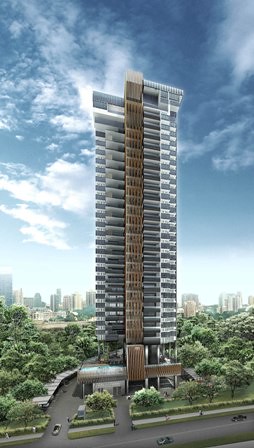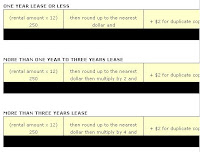Home Financing Bank Loan and Mortgages in Singapore
Do I quailfy for a Singapore dollar housing loan if I am a foreigner?
Unless you are a Permanent Resident, you are entitled to one Singapore dollar housing loan.
What are the ways for me to finance a property purchase?
There are several ways for you to finance your purchases. Basically, you can either use your CPF and/or loan from commercial banks/finance companies. Often, a combination of different types of loans and savings from your CPF is used. From 19 July 2005, the maximum housing loan for private properties and HDB flats should not exceed 90% of the purchase price or valuation of the property, whichever is lower.
What are the key factors that will affect my housing loan application?
Since the main concern for banks would be whether the borrower would have money coming in the future date to repay a loan, your bank will usually examine the current market value of the property (if any); your income; your employment history; your assets and liabilities; the total equity which you are committing to the property, and your age.
What are the charges in taking a bank loan?
Each Bank has its own set of charges, but generally the following applies:
Processing fee: for processing a loan application
Pre-payment fee: for repaying part of or the full loan ahead of schedule
Third-part charges: for the valuation fee, legal fee (including the fee for the lawyer to act behalf of the bank), stamp duty, and insurance
Others: Some banks also charge for making changes to the original loan application or for canceling a loan offer after you have accepted it.
Is there any other loan that will help me to pay for the down payment of a property?
Yes, you may use a bridging loan, which is a short-term loan designed to tide the borrower over a period when he needs cash. However, because bridging loans are usually available for those taking up a housing loan from the same bank. Some people also use this type of loan while waiting for the release of his CPF funds.
What are the documents I need to produce a housing loan?
Most financial institutions require the following items:
Latest CPF statement for CPF withdrawn under the Residential Property Scheme (for refinancing loans)
Tenancy agreement (if any)
Latest 6 months to 2 years housing loan statements from current financier (for refinancing loans)
Latest income tax Notice of Assessment/ last 3 moths pay slips or the Notice of Tax Assessment for those self-employed
Latest CPF statement of account
Option to purchase (if any)
When should I repay the full bridging loan?
You have to do so upon completing the transaction of purchasing the property (usually 3 months), subject to a maximum of 6 months.
How is the bridging loan interest calculated?
It is calculated on a day to day basis and is payable every month.
Is there any type of loan available for me to rebuild my bungalow?
You can apply for a reconstruction loan.
Can I use an overdraft to rebuild my bungalow?
You can use an overdraft to rebuild your property, but a reconstruction loan has a lower interest rate, and you only need to pay for the interest rates on the amount you have used.
Should I refinance my property with another bank with much lower interest rates?
It all depends. This is because you must take into account the pre-payment penalties involved in redeeming your mortgage earlier than the maturity date. Therefore, you have to compare the monthly installments offered by each bank and include the penalties for terminating the original loan. Also, it would be not be sensible to refinance at the end of a loan period since the interest gain in the new bank would be minimal.
Can I redeem my mortgage?
It may be redeemed any time, however, but you may have to pay a fee for early redemption. The fee is known as the pre-payment penalty, and is based on the mortgage loan amount or outstanding amount.
How can I redeem my mortgage?
You may do so by giving a notice of redemption to your Bank. Your lawyer will prepare a "total discharge of mortgage". He will then arrange with the Bank's lawyer to execute the Total Discharge of Mortgage, and register it at the Registry of Land Titles. You then pay off the mortgage loan in exchange for the signed "total discharge of mortgage" or "deed of reassignment".
What happens if I default on my mortgage loan?
The following are the actions the Bank can take:
Sell your property to recover the money lent to you;
Appoint a receiver, that is to appoint a person to take charge of the property if the bank wishes to obtain rents from your property;
Insure your property against fire and other fortuitous accidents, and
Refuse to allow you to redeem the mortgage of another property if you have mortgaged more than one property.
Can I sue the Bank if my property which I defaulted on the mortgage loan is sold at a very low price?
Unless you can prove that the Bank has acted carelessly or recklessly in selling your property at a much lower price that what the market is willing to pay, the Court will not interfere.
After the Bank sells my house, will I be entitled to any money?
Yes, provided that there is any left after the Bank recovers the money lent to you, including all other expenses in selling your house.
If the bank's lawyers delayed their preparation of a mortgage which consequently required me to pay interest to the Seller, what should I do?
Unfortunately you will not have any course of action against the bank since the bank does not bind itself to you to provide the loan before the completion date. The bank's lawyers also do not represent you, therefore you will also have no recourse against them.
While awaiting for my Permanent Resident pass, I am buying a house with my sister who is a Singaporean. Will we be able to obtain a Singapore dollar loan from banks?
Each bank has its own loan criteria. Generally, banks are able to grant you a loan for Singapore citizens, if your immediate family members meet their required age and income.
If I am a Permanent Resident getting a home loan, how can I obtain a home loan?
To obtain a Singapore dollar loan, you have to provide:
a written undertaking that you do not have outstanding housing loans from any other financial institutions in Singapore
you are buying the property for owner-occupation

